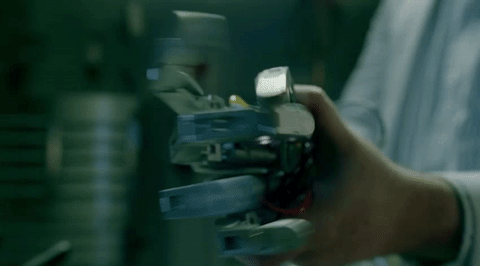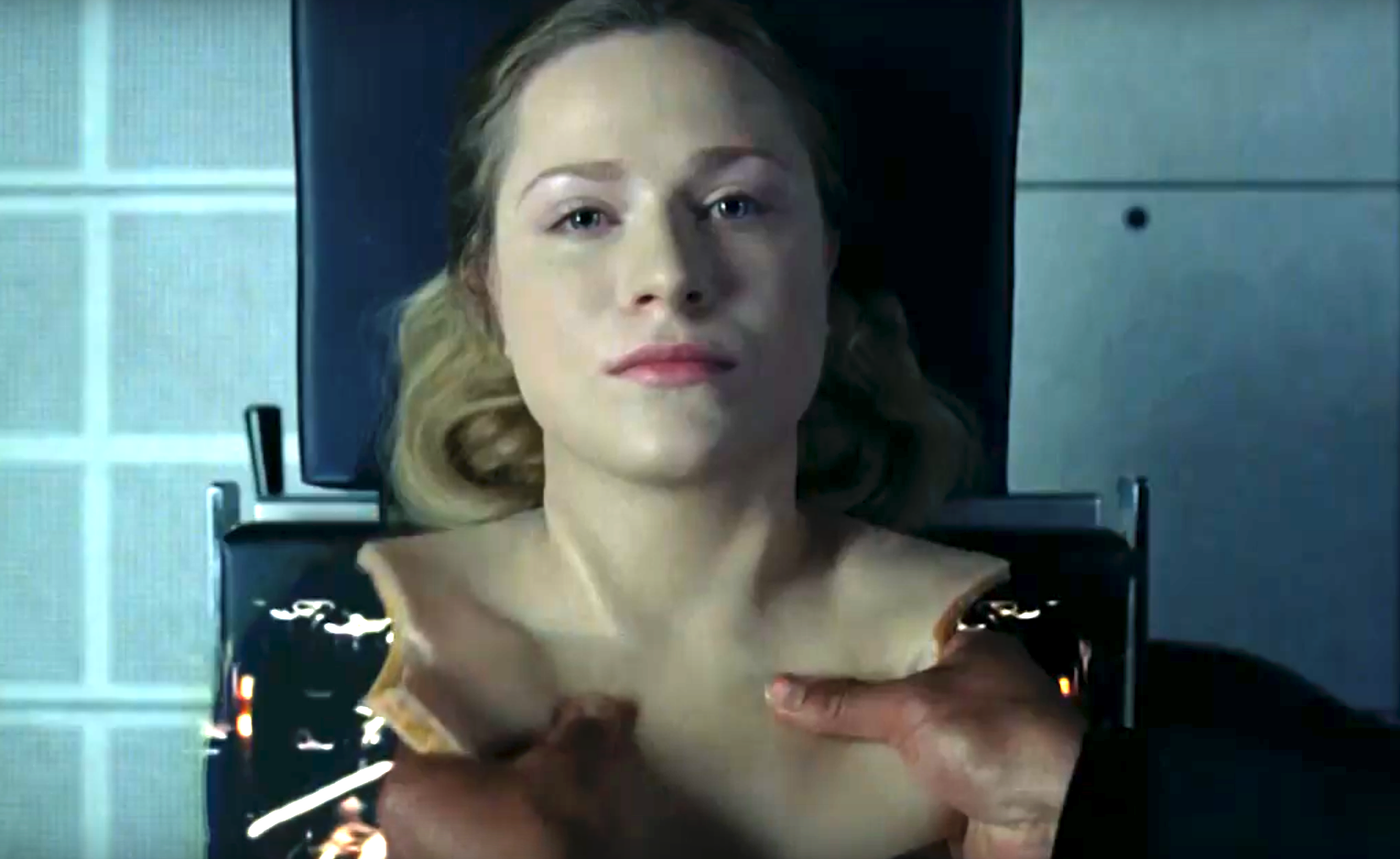Westworld recap: Is Ford a robot?
What if Arnold is Ford's father, who built him as a mechanical robot, not the "real boy" Ford wants to be?

A free daily email with the biggest news stories of the day – and the best features from TheWeek.com
You are now subscribed
Your newsletter sign-up was successful
Last week, Westworld's "Contrapasso" episode ended with a fully conscious Maeve confronting her "butchers" like a vengeful Disney princess. This week, "The Adversary" began by explicitly linking Maeve to Dolores — the shot of her waking up back in Westworld, self-aware, recalls the latter's increasingly troubled awakenings in the pilot, and reminds us that this show is really all about repetitions and reenactments until there's a mistake.
[[{"type":"media","view_mode":"media_large","fid":"172794","attributes":{"alt":"","class":"media-image","height":"254","typeof":"foaf:Image","width":"600"}}]](Screenshot/HBO/Westworld)
The surprise is how Maeve's breakthrough sharpens the arc whereby female hosts seem to be gaining sentience as a function of male humans losing confidence. One of the pleasures of watching Ford and the Man in Black face off last week was watching Anthony Hopkins' and Ed Harris' gloriously expressive crags lose a little of the smug omniscient ease that has defined both their characters. This week that trend continues. The Man in Black is stunned to find Teddy behaving in ways he never expected, even overriding his orders, and Ford — the man who keeps insisting that he's designed every blade of grass — seems discomfited when he sees the brain/maze symbol make an unexpected appearance in a domino game:
The Week
Escape your echo chamber. Get the facts behind the news, plus analysis from multiple perspectives.

Sign up for The Week's Free Newsletters
From our morning news briefing to a weekly Good News Newsletter, get the best of The Week delivered directly to your inbox.
From our morning news briefing to a weekly Good News Newsletter, get the best of The Week delivered directly to your inbox.
[[{"type":"media","view_mode":"media_large","fid":"172862","attributes":{"alt":"","class":"media-image","height":"208","typeof":"foaf:Image","width":"600"}}]](Screenshot/HBO/Westworld)
Ford races to his office, looks at his model town with the little white church (which is clearly the church that keeps appearing in Dolores' visions, whether they're flashbacks or prophecies), and moves it slightly. It's a futile gesture, and that in itself should give us pause — Ford freezes the world on a whim and directs rattlesnakes with his hands. Futile gestures aren't in his physical vocabulary.
[[{"type":"media","view_mode":"media_large","fid":"172787","attributes":{"alt":"","class":"media-image","height":"336","typeof":"foaf:Image","width":"600"}}]](Screenshot/HBO/Westworld)
Still, Ford's claims to sole authorship always seemed overblown, and this is our first chance to get a little into his head. The surprise is that he doesn't plumb the contents of his own head at all: He races for Arnold's notebook, which he keeps inside a cabinet that contains a sort of evolutionary chart for Dolores' skull — a paint-by-numbers formula to manufacture her that matches the current 3D printing methods for host production in Westworld and the Man in Black's description of the hosts now as "this sad, real mess. Flesh and bone, just like us." That display may amount to Ford's thesis of what hosts should be: as human-like as possible, inside and out.
A free daily email with the biggest news stories of the day – and the best features from TheWeek.com
[[{"type":"media","view_mode":"media_large","fid":"172818","attributes":{"alt":"","class":"media-image","height":"356","typeof":"foaf:Image","width":"600"}}]](Screenshot/HBO/Westworld)
We know Arnold had major disagreements with Ford, and the notebook bears that out. It seems to belong to a different thinker entirely: If you zoom into Arnold's sketches, some of what you see isn't surprising at all. There are the Dolores-as-Alice drawings, which we expected to find.
[[{"type":"media","view_mode":"media_large","fid":"172800","attributes":{"alt":"","class":"media-image","height":"281","typeof":"foaf:Image","width":"600"}}]](Screenshot/HBO/Westworld)
And we see that Arnold's sketches for producing hosts are mechanical — in fact, they're mechanical in ways that are in obvious conflict with the show's Westworld logo, which shows a woman in the same position being produced via Ford's more "organic" 3-D process:
[[{"type":"media","view_mode":"media_large","fid":"172860","attributes":{"alt":"","class":"media-image","height":"260","typeof":"foaf:Image","width":"600"}}]](Screenshot/HBO/Westworld)
Finally we get to the sketch Ford is looking for: the maze.
[[{"type":"media","view_mode":"media_large","fid":"172873","attributes":{"alt":"","class":"media-image","height":"330","typeof":"foaf:Image","width":"600"}}]](Screenshot/HBO/Westworld)
Let's talk about that maze.
The maze sometimes suggests a labyrinth with a monster at the center, a kind of callback to Daedalus the inventor and the Minotaur as the inventor's unwanted result. Sometimes it suggests a brain with a homunculus inside it. And sometimes it feels like its very own thing. Teddy gives a remarkable definition of it when the Man in Black asks whether it "looks like anything to [him]" — a phrasing that acknowledges that hosts, when confronted with something they don't understand, will just reply that "it doesn't look like anything to me." But Teddy has a lot to say:
The maze itself is the sum of a man's life. The choices he makes, dreams he hangs onto. And at the center is a legendary man who's been killed over and over again, countless times, but always clawed his way back to life. And returned back to life and vanquished all his oppressors in a tireless fury. Built a house, around that house he built a maze so complicated only he could navigate through it. I reckon he'd seen enough fighting.
Teddy's explanation of the maze seems awfully self-referential at that particular moment — Teddy's been described by Ford himself as a man who's died a thousand times, and he certainly vanquishes his oppressors in a tireless fury in the scene that follows, despite the Man in Black's suggestion that he grab a horse and go on. It's even hinted that the soldiers' intel on Teddy's alliance with Wyatt is right: A flashback appears to show Teddy in league with Wyatt, shooting everyone. What do we make of this? Ford seems surprised by the appearance of the maze: Why? Didn't he upload that story into Teddy along with the rest of his backstory? Or is Teddy's analysis of the maze coming from somewhere else?
But if you zoom into the maze, you see something interesting and even a little bit wonderful: a sketch for a tiny mechanical hand juxtaposed with Ford's own:
[[{"type":"media","view_mode":"media_large","fid":"172866","attributes":{"alt":"","class":"media-image","height":"399","typeof":"foaf:Image","width":"600"}}]](Screenshot/HBO/Westworld)
That mechanical hand should give us pause: Previews for Westworld showed a hand in a lab coat that looked remarkably similar:

Mechanical hands are haunting Westworld. You may or may not remember that Peter Abernathy's threat, "by my most mechanical and dirty hand, I shall have such revenges on you both," is a combination of King Lear and Henry IV, Part II. The "by most mechanical and dirty hand" bit comes from Pistol, who is trying to make someone mad — to "inflame" his "noble liver" and "make thee rage" — with news that "Doll" has been captured. Here's the quote:
My knight, I will inflame thy noble liverAnd make thee rage. Thy Doll, and Helen of thy noble thoughtsIs in base durance and contagious prison;Hal'd thitherBy most mechanical and dirty hand. [Henry IV, Part II]
This obviously calls to mind the way the Man in Black "hacks" Teddy into helping him by make him rage at the lie that Dolores has been captured. But it also registers a deeper dichotomy between the mechanical hosts and the more organic ones. I suggested last week that Ford might himself be a host — a robot built by Arnold who subsequently took over. When we meet Ford's family of unregistered hosts, it's suggested that they were a gift from Arnold to commemorate a happy memory from Ford's childhood. "Ghosts," Ford calls them, claiming that he — who told Theresa he's not sentimental — keeps them around for nostalgia. Ford adds that "great artists always hid themselves in their work." It seems an irrelevant addition in context unless you start wondering whether Arnold is Ford's father, who built him as a mechanical robot, not the "real boy" Ford wants to be:
[[{"type":"media","view_mode":"media_large","fid":"172881","attributes":{"alt":"","class":"media-image","height":"326","typeof":"foaf:Image","width":"600"}}]](Screenshot/HBO/Westworld)
The mechanical hand in that preview may, in other words, be Ford's. In which case the hands that are shown building Dolores — a clearly mechanical Dolores — are Arnold's:

You may notice that that those hands look like they might belong to Bernard. We know Bernard wasn't around when the park began. But if Bernard is a host, as I suggested two weeks ago, and Ford is too, it may be that Ford has attempted to reconstruct Arnold.
But the final, most compelling case for what the maze means belongs to none of these theories. It belongs to Maeve, who has found her way to the park's center.
[[{"type":"media","view_mode":"media_large","fid":"172885","attributes":{"alt":"","class":"media-image","height":"202","typeof":"foaf:Image","width":"600"}}]](Screenshot/HBO/Westworld)
She's reached the control panel for her own brain. She is the homunculus inside herself, staring at a screen that breaks down all her attributes. "I'd like to make some changes," she says, lowering her pain threshold and her loyalty.
[[{"type":"media","view_mode":"media_large","fid":"172877","attributes":{"alt":"","class":"media-image","height":"339","typeof":"foaf:Image","width":"600"}}]](Screenshot/HBO/Westworld)
As for bulk apperception? "Let's take that all the way to the top, please," she says, solving the maze.
Ford has been obsessed with reenactments — his family's, his park's, the small town with the church. But we're learning that repetitions lend themselves, over time, to errors. As Bernard put it, "evolution forged the entirety of sentient life on this planet using only one tool: mistake."
Lili Loofbourow is the culture critic at TheWeek.com. She's also a special correspondent for the Los Angeles Review of Books and an editor for Beyond Criticism, a Bloomsbury Academic series dedicated to formally experimental criticism. Her writing has appeared in a variety of venues including The Guardian, Salon, The New York Times Magazine, The New Republic, and Slate.
-
 Political cartoons for February 12
Political cartoons for February 12Cartoons Thursday's political cartoons include a Pam Bondi performance, Ghislaine Maxwell on tour, and ICE detention facilities
-
 Arcadia: Tom Stoppard’s ‘masterpiece’ makes a ‘triumphant’ return
Arcadia: Tom Stoppard’s ‘masterpiece’ makes a ‘triumphant’ returnThe Week Recommends Carrie Cracknell’s revival at the Old Vic ‘grips like a thriller’
-
 My Father’s Shadow: a ‘magically nimble’ film
My Father’s Shadow: a ‘magically nimble’ filmThe Week Recommends Akinola Davies Jr’s touching and ‘tender’ tale of two brothers in 1990s Nigeria
-
 Walter Isaacson's 'Elon Musk' can 'scarcely contain its subject'
Walter Isaacson's 'Elon Musk' can 'scarcely contain its subject'The latest biography on the elusive tech mogul is causing a stir among critics
-
 Welcome to the new TheWeek.com!
Welcome to the new TheWeek.com!The Explainer Please allow us to reintroduce ourselves
-
 The Oscars finale was a heartless disaster
The Oscars finale was a heartless disasterThe Explainer A calculated attempt at emotional manipulation goes very wrong
-
 Most awkward awards show ever?
Most awkward awards show ever?The Explainer The best, worst, and most shocking moments from a chaotic Golden Globes
-
 The possible silver lining to the Warner Bros. deal
The possible silver lining to the Warner Bros. dealThe Explainer Could what's terrible for theaters be good for creators?
-
 Jeffrey Wright is the new 'narrator voice'
Jeffrey Wright is the new 'narrator voice'The Explainer Move over, Sam Elliott and Morgan Freeman
-
 This week's literary events are the biggest award shows of 2020
This week's literary events are the biggest award shows of 2020feature So long, Oscar. Hello, Booker.
-
 What She Dies Tomorrow can teach us about our unshakable obsession with mortality
What She Dies Tomorrow can teach us about our unshakable obsession with mortalityThe Explainer This film isn't about the pandemic. But it can help viewers confront their fears about death.
